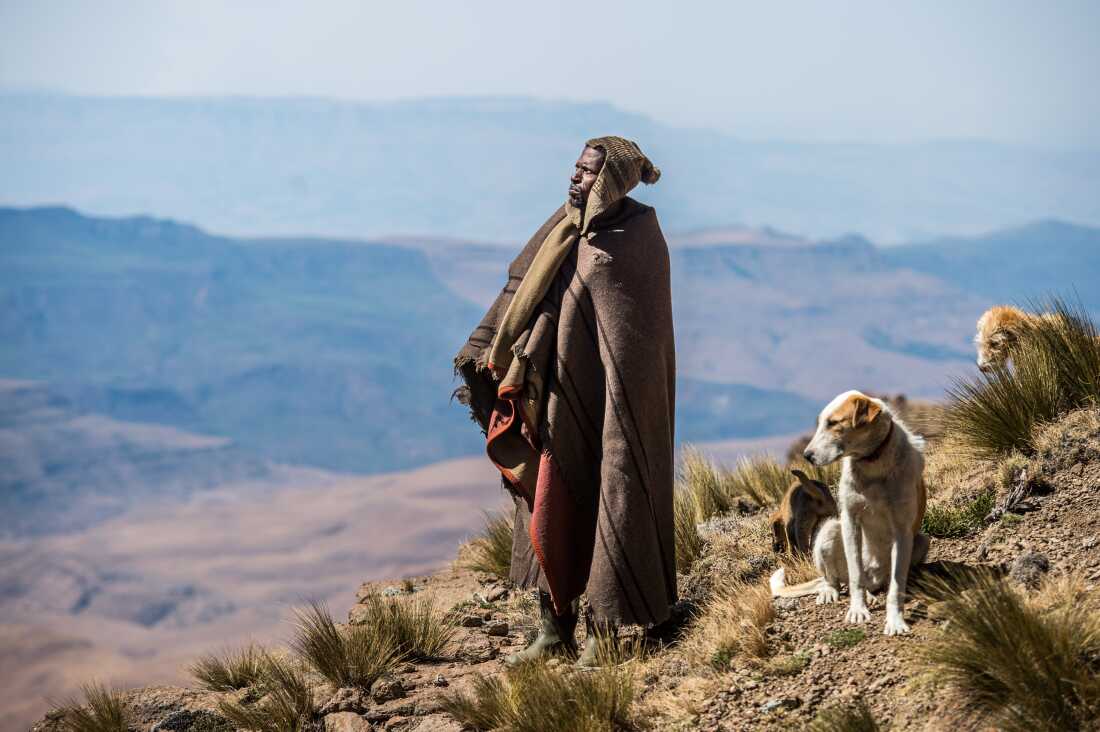A man plays an accordion while people congregate at a traditional tavern, known locally as a shabeen, in Semonkong.
MARCO LONGARI/AFP
hide caption
toggle caption
MARCO LONGARI/AFP
MASERU, Lesotho – In the mountainous kingdom of Lesotho, Puseletso Seema holds a revered place in the nation’s cultural tapestry as the celebrated “Queen of Famo.” This traditional accordion-driven music genre resonates deeply with the Basotho people, embodying their pastoral heritage and emotional expression.
Despite her iconic status, the 77-year-old grandmother lives modestly in a humble, weathered dwelling on a dusty rural road outside the capital. Around her, children ride donkeys beneath towering peaks, and shepherds draped in vibrant blankets tend to their sheep.
Winter’s chill fills the air, with crisp blue skies and snow-capped mountains in the distance. Without access to electricity and battling persistent coughs, Seema reflects on her groundbreaking journey as the first woman to carve a path in a male-dominated musical tradition.

Puseletso Seema, known as the ‘Queen of Famo,’ during a conversation at her residence.
Kate Bartlett/NPR
hide caption
toggle caption
Kate Bartlett/NPR
“Famo is like the jazz of Lesotho,” Seema shares. “It’s a genre that channels deep emotions – joy, sorrow, every feeling you carry inside.”
Journalist Motsamai Mokotjo describes famo as “a blend of folk poetry and accordion melodies, deeply rooted in Basotho traditions.”
“It narrates the Basotho’s history and current realities, much like how hip hop serves as a voice for many in America,” he adds.
Melodies of the Shepherds
Lesotho ranks among the world’s most impoverished nations, and Seema’s upbringing was marked by hardship. Without formal education, she was tasked with tending livestock from a young age. Though shepherding was traditionally a boy’s role, Seema’s family had no sons, and she embraced the challenge.
“I often found myself in playful scuffles with the boys while out in the fields,” she recalls with a smile. “That’s when I began singing famo.”
Originally a rural folk music of shepherds, famo traveled with Basotho migrant workers to South Africa’s mining towns during the 20th century.

A famo artist busking in Maseru’s streets.
Kate Bartlett/NPR
hide caption
toggle caption
Kate Bartlett/NPR
Mpho Malikeng, a Maseru-based musician and famo specialist, explains, “The accordion is the heart of famo music, introduced to Basotho workers in South African mining hubs.”
Encircled by South Africa, Lesotho’s economy has long been tied to the mining industry. After grueling shifts underground, miners would unwind in lively shebeens, where famo music thrived.
Seema herself ventured to Johannesburg, the famed “City of Gold,” not to mine but to entertain the miners – boldly stepping into a male-dominated arena once more.

A shepherd wrapped in a blanket with his dogs in Lesotho’s mountainous terrain.
Edwin Remsberg/Universal Images Group Editorial
hide caption
toggle caption
Edwin Remsberg/Universal Images Group Editorial
“I was the pioneer female famo producer,” Seema states proudly. “Traditionally, men sang while women danced provocatively in the shebeens.”
Official Prohibition
Over time, famo music has taken a darker turn, becoming linked with gang-related violence.
Though precise figures are unavailable, the violence tied to famo has escalated to the point where Lesotho’s government imposed bans on certain groups and restricted media coverage of the conflicts in 2024.
Prime Minister and diamond entrepreneur Sam Matekane expressed grave concern: “Our communities are devastated by murders linked to famo gangs.”
“We have officially designated these groups as terrorists,” he declared.

Sam Matekane, Lesotho’s businessman-turned-politician, addresses the media in Maseru.
Silence Charumbira/AP
hide caption
toggle caption
Silence Charumbira/AP
The crackdown followed a surge in retaliatory killings linked to famo disputes, including a tragic incident in April where five family members were murdered. In July, famo artist Khopolo Kholue and a journalist investigating the violence were fatally shot.
Mpho Malikeng, a cultural advocate and musician, attributes the violence to rival famo performers exchanging sharp lyrical insults that escalate beyond music.
“It’s like a lyrical duel – each artist disses the other, pushing for stronger verses, but sometimes it spills into real-world conflict,” he explains.
Echoes of Hip Hop Rivalries
Malikeng compares the famo feuds to the infamous East Coast-West Coast hip hop rivalry of 1990s America, which culminated in the deaths of Tupac Shakur and The Notorious B.I.G.
Territorial disputes also fuel tensions. “Being caught listening to a rival artist in certain neighborhoods can be dangerous,” he warns.
He criticizes the government’s sweeping bans, noting that some politicians and security personnel are allegedly entangled with famo gangs.
Prime Minister Matekane acknowledged this troubling overlap: “We’ve discovered that some security officers are actively involved in famo gangs. I urge them to abandon these activities and fulfill their duties.”
Requests for comment from Police Minister Lebona Lephema were declined.
Despite its small population of 2.3 million, Lesotho suffers from high homicide rates and widespread illegal firearms. The famo-related violence has even crossed into neighboring South Africa.
Many Basotho illegal miners, known as “zama zamas” or “risk takers,” continue to embrace famo music while navigating dangerous underground tunnels. Some are also implicated in gang conflicts.
Seema, the “Queen of Famo,” refrains from discussing the violent aspects of the music but firmly states, “I reject music that promotes vulgarity, insults, or hatred.”

















